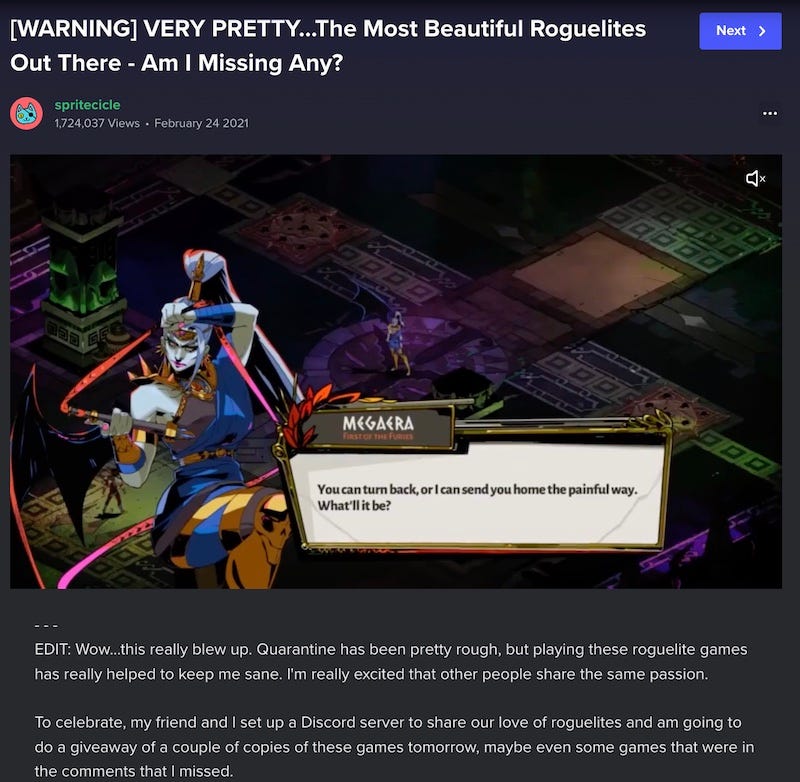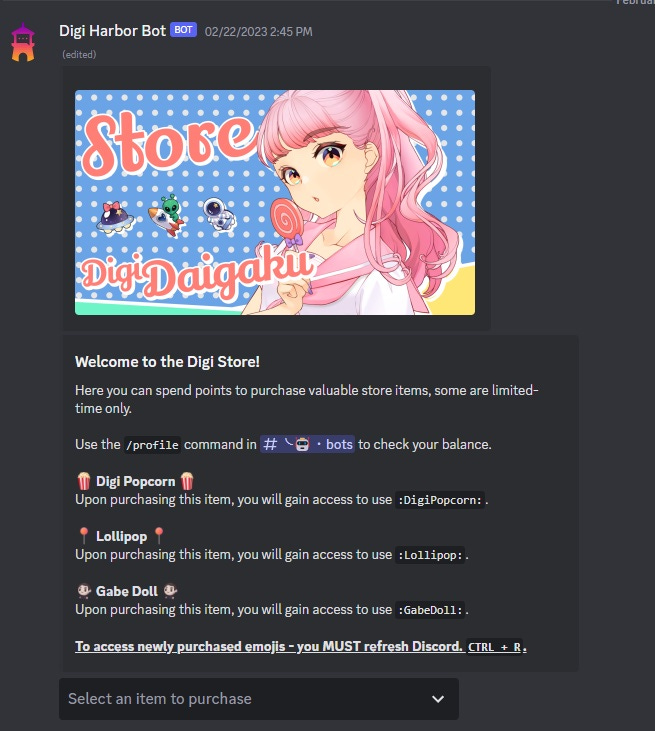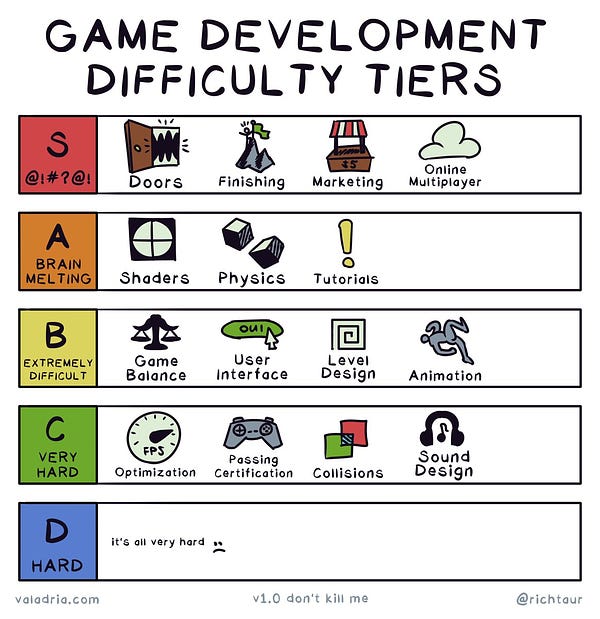Assembling a community... before you start making your game?
Publikováno: 8.3.2023
A novel idea. Also: lessons from Slime Rancher 2.
[The GameDiscoverCo game discovery newsletter is written by ‘how people find your game’ expert & company founder Simon Carless, and is a regular look at how people discover and buy video games in the 2020s.]
As we slide into midweek, time to send out another of our signature ‘how many links can we fit in a single email?’ missives. And though we’re ailing slightly, we’ll pull through and deliver for you…
[If you dig what we do, support us a GameDiscoverCo Plus paid subscription. You get our an extra data-rich weekly PC/console game trend analysis newsletter, an interactive Steam ‘Hype’ chart back-end, two ‘how to’ eBooks, a member-only Discord & more. Sign up today.]
Can you make a community, then pick the game?
So we had a chance to talk to Colin Feo & Richard Warren at Windwalk Games recently. They’re a VC-funded company that is both making their own online games, but also selling tech and expertise around growing community, especially via Discord.
This struck a chord with us because, it’s true - how many times have you seen a big trailer announcement push a bunch of users onto a game’s Discord, but then give them nothing - or almost nothing - to do when they get there?
So how did Windwalk craft a solution for this? They’ve already had learnings from killing a social deception game that didn’t work out. This was Enemy On Board (above), which they wrote a public post about having to move on from in early 2021.
Though it had some hardcore fans, the game peaked at about 900 CCU on Steam. But note some of the positives Windwalk mentioned when they postmortem-ed the game: “We built a healthy, thriving Discord community of over 30,000 members with a $0 budget. 95% of studios I have talked to are flabbergasted by this, and want to know how we did it.”
So when it came to their next project, they did something I haven’t seen anyone do. They created an ‘influencer’ called Spritecicle, they gave away keys to popular roguelite games like Griftlands on IMGUR and Reddit, and they started evangelizing the roguelite genre. The goal? To gather potential players on a Discord server & ask them what type of co-op roguelites they wanted to play:
As Colin told me, “if we can talk to these users and find out the stuff that’s important to them”, then Windwalk is able to ask them about how they play co-op titles and exactly what they’re looking for: “Nothing beats being able to talk to” hardcore fans - “there’s no artificiality to it.”
What’s interesting about this approach is that the feedback is even one step before games like The Wandering Village. It was showing concept art for feedback on Twitter even before its Kickstarter launched, a couple of years before its successful Steam launch. And we thought that was early!
But Windwalk’s approach was to make a general-interest Discord, and then workshop a game around it. Essentially: “Build a community early, to make sure you are making a game that has an audience.” Then closer to launch, you can build a game-specific Discord community, and work with marketing to help plan your launch.
The game that Windwalk ‘workshopped’ is now signed with a publisher. In addition to that, they’re working with a number of game, music, and Web3 companies - including the My Hero Academia physical CCG, Universal Music Group, and Limit Break - to help run their Discords and community outreach.
And they’re just launching Harbor.gg, which distils all of their learnings around Discord into a ‘no code’ system to be used by community managers. Features include a community loyalty currency, social amplification, trading card systems, and matchmaking and playtesting systems.
The idea, as we’ve previously talked about in the GameDiscoverCo newsletter, is to “gather your army in your Discord, and march them into battle on other platforms.” And Feo notes that today’s execs “want [player] communities that help solve strategic problems.”
So it’s not just ‘dunk some players in your Discord and ignore them until launch’, it’s actual growth strategies, via engaging players constantly on community platforms like Discord. This takes more complex tools and strategies than simply ‘ban moderation’.
Anyhow, whether you use Windwalk’s expertise and tools or not, the message is clear: there’s a lot of competing game communities, and if you’re not spending time on both growth and retention, your players may be disengaged when you need ‘em most.
Slime Rancher 2: GaaS lessons from Early Access
We dig adorable slime farming sequel Slime Rancher 2, which co-creator Nick Popovich already revealed sold 300,000 units just after its Sept. 2022 debut. (We estimate >500k sold on Steam now, and approaching 2 million players in total, including Xbox/PC Game Pass downloads!)
So it was great to see GameDeveloper.com’s Bryant Francis catch up with Popovich during DICE to ask him how he keeps interest high - through multiple Early Access updates such as the winter-themed Song Of The Sabers patch. Key takeaways:
Make updates that ‘stand on their own’: the Song Of The Sabers update has a ‘this is a whole mini-adventure we’re rolling out for you!’ feel. And to counteract ‘dead game’ complaints, Popovich says: "There's different [things] devs can do to curb some of that, and one of those ways is making these content drops that feel 'whole’.”
Welcome players back in to your game easily: you don’t want a high difficulty curve - or broken saves - if you come back to a game after a major patch/update. Popovich notes: "We're going to structure it so getting back into the game is not like a car crash… it's more like a warm bath you're slipping into."
Each update feels like a win, not ‘adding something unfinished that should have been there anyhow’: particularly for Slime Rancher 2: “We know kids are playing, so they have no sense of what an Early Access Game is," Popovich said: "We don't want them to bump against things that dispel the fantasy of the game for them.”
Sure, these updates like Song Of The Sabers actually do have bugfixes and additional changes added in (scroll down!), from new UI button animations to “replaced outdated visual effects and materials for classic slimes”, and even, uh, “no more hen hens trapped below the coop in gully plot”.
But the point is strong - Monomi Park’s themed content updates for SR2 - as teased here - are strong & interesting, with players ‘going on a journey’ via them: “Further out, Beatrix’s adventure will finally take her into the massive and mysterious Grey Labyrinth that blocks her progress across the furthest reaches of the island.” Sounds intriguing!
So make your big patches and updates tell a story through careful pre-imagining. And if you do need to push ‘here’s a bunch of unrelated bug fixes’ updates, maybe make them small updates/’patch notes’ on Steam, as opposed to a big publicity event?
The game discovery news round-up..
Finishing up the free newsletters for this week - though lucky Plus subscribers still get our extra Friday ‘game trends’ newsletter - here’s new discovery data & insight:
Microsoft continues to push back hard on ‘Call Of Duty is a super big deal’ claims, telling Axios that “just 3% of all PlayStation users would switch to buying an Xbox if Microsoft pulled Call of Duty from PlayStation”, according to its own UK survey - versus the 15% that the UK’s CMA found via its own survey. Numbers!
A super-important GDC 2023 reminder for Europeans from Thomas at ICO: “This Sunday [12th], the U.S. is switching to summer time. Europe is not switching for another 2 weeks (26th of March). That means that your GDC meeting times need to be set to PST natively.” Don’t get foxed by this.
There’s a rumor - based on text on Meta’s Quest site - that the firm “is reportedly testing out a Quest Pass subscription service that'll let gamers choose two games for "free" each month, and keep them as long as they're subscribed.” Unclear which games would be opted in and how devs would be compensated, but keep an eye on it…
RockPaperShotgun had a chance to talk to Valve’s Lawrence Yang and Pierre-Loup Griffais about one year of Steam Deck, and there’s some interesting stats in there: “Of the people who've purchased a Steam Deck, 42% of them end up spending the majority of their Steam gaming time on Steam Deck” vs. a desktop PC (or laptop).
The summer ‘E3 adjacent’ Xbox streaming showcase has been dated for June 11th, and it’ll immediately be followed by a dedicated showcase for Bethesda’s Starfield. (E3 itself starts on Tuesday, June 13th and runs until that Friday. We’re still waiting for an exhibitor list on it.)
Former Apple Arcade exclusive Lego Builders Journey has hit 10 million ‘players’ after an Epic Games Store giveaway over holiday 2022. We think the ‘7 million new players’ number might be EGS key redemptions, not actual plays. (We estimate 150,000 paid players for the game across Steam, PlayStation and Xbox - so maybe 2.5-3 million Apple Arcade players?)
TiMi’s Bob Holtzman pointed out that there’s more ‘GaaS as a service’ companies on the ascendancy in our space, including Hi-Rez Studios spinoff Rallyhere, ‘back-end game platform’ Pragma, and online-centric game back end Accelbyte, which is already used by companies like Krafton and Remedy - interesting trend.
Just Sony things: this month’s PlayStation Plus ‘Essential’ games are Battlefield 2042 (PS5/PS4), Minecraft Dungeons (PS4) and Code Vein (PS4); and the PlayStation 5 x Discord integration rolled out in today’s (already announced) patch: “you can now use Discord voice chat on your PS5 to talk with your friends on desktop, web, console, or mobile.”
The niche (but cool!) Playdate handheld - 25k sold so far - got a few updates this week, including an imminent price rise to $199, as well as “Playdate's first onboard ‘Catalog’ system. There, users can purchase and download games directly to the Playdate hardware”, instead of sideloading or playing the ‘free’ Season One games.
Microlinks: here’s an AI bot that performs a rap about your video game, weirdly; why demos don’t hurt your visibility on PC/console stores; Google sees a post-Stadia future in supporting live-service games.
Finally, How To Make A Video Game All By Yourself writer Matt Hackett wrote this adorable list of ‘tricky things when making games’, and we just had to pass it along:
[We’re GameDiscoverCo, an agency based around one simple issue: how do players find, buy and enjoy your PC or console game? We run the newsletter you’re reading, and provide consulting services for publishers, funds, and other smart game industry folks.]




